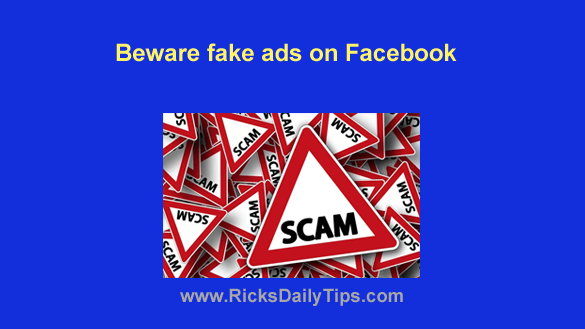
Want to get my easy to follow Tech Tips in your email?
Sign up for my daily Rick’s Tech Tips Newsletter!
As you probably know, Facebook earns the vast majority of their revenue from ads. And I’m sure you’ve probably noticed that they’re everywhere.
Some scammers are now taking advantage of Facebook’s advertising potential by posting fake ads that are designed to steal your money, your personal information, or both.
Most fake ads will show up in your Newsfeed just like any other post. If you see something that appears to be an ad but you don’t see the word “Sponsored” above it, you can be 100% certain that it’s a scam.
Other fake ads might show up in the various advertising sections of the page.
ALL legitimate ads on Facebook will be marked with the word “Sponsored”, but just because an ad bears the “Sponsored” designation that doesn’t necessarily mean that ad isn’t fraudulent. It simply means the person who posted it is paying Facebook to display it.
Unfortunately, Facebook does a poor job at vetting fraudulent ads and blocking them before they go live. As always, if an offer sounds to good to be true, it probably is.
If you happen to click or tap on a fraudulent ad you’ll probably be taken to a malicious website that’s designed to steal your personal information and credit/debit card info. And it just might download malware onto your device to boot.
Bottom line: Always evaluate any ad you see on Facebook with a healthy dose of skepticism, and that definitely includes ads that are clearly marked as “Sponsored”.
And always remember that you can safely assume that any ads that aren’t marked as “Sponsored” are fake without even having to think about it.
Carefully analyze exactly what the ad is offering. Does it make sense for the company from a business standpoint? If not, the “offer” is probably a scam (for example, you won’t be buying a brand new Dell laptop for $59).
If you have even the slightest doubt about the legitimacy of an ad, don’t click or tap on it because simply visiting a malicious web page could result in malware being downloaded onto your device. And that’s a headache you can live without.
Bonus tip: Unfortunately it’s getting harder by the day to stay safe online. This can help. (#ad)